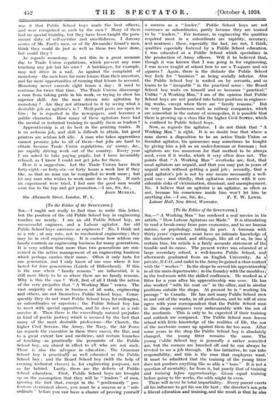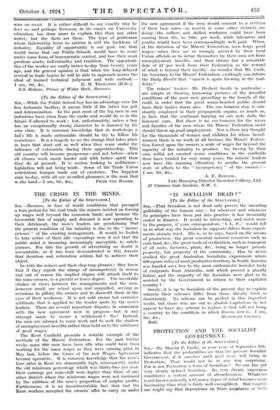[To the Editor of the SPECTATOR.] SIR,—" A Working Man
" has rendered a real service in his article, " How Labour Agitators are Made." It is stimulating to read a break-away from pure economics, and to see human nature, or psychology, taking its part. A foreman with thirty years' experience must have an intimate knowledge of the mechanic's mind, and although, like all of us, he has al certain bias, his article is a fairly accurate statement of the trouble and its cause. The present writer was educated at a large secondary school, a well-known Public School, and afterwards graduated from an English. University. As a private, N.C.O., and cadet in the Army he gained a close contact with the " worker." In the shops he served his apprenticeship in all the main departments ; in the foundry with the moulders ; in the tool-room with the skilled craftsmen. He worked as a fitter for a year after his apprenticeship was over. He has also worked "with his coat on" in the office, and in similar positions outside the shops. At present he is " working his passage " to Canada. He has met many Public School men in and out of the works, in all professions, and he will at once agree with your correspondent that the Public School man in the shops compares very unfavourably with the son of the mechanic. This is only to be expected if their training and outlook are compared. The Public School man leaves school with little knowledge of the realities of life, the son of the mechanic comes up against them far too soon. After some years in the shop the Public School boy is absolutely changed, the young fitter remains the same. The young Public School boy is generally a rather conceited ass, but the corners are knocked off and he can always be trusted to see a job through. He has initiative, he can take responsibility, and this is the man that employers want. It must be admitted that the training of the young fitter does not produce anything like so able a " boss." It is not a question of mentality, far from it, but purely that of training and training before apprenticeship. Given equal training before going to the works, the odds might be even.
There will never be total impartiality. Every parent exerts
all influence to get his son the best ; the director's son gets a liberal education and training, and the result is that he also wins on merit. It is rather difficult, to say exactly why he does so, -and perhaps Newman, in his essays on University education, has done more to explain this than any other .writer, but the facts are these. The type of gentleman whom Galsworthy loves to satirize is still the backbone of industry. Equality of opportunity is our goal, but that would mean that our Public Schools would have to come sunder some form of bureaucratic control, and lose their most .precious assets, individuality and tradition. The opportuni- ties of the worker are vastly better to-day than twenty years Ago, and the general opinion is that when the long-delayed revival in trade begins he will be able to approach nearer the ideal of trained technical judgment and wide outlook.—



















































 Previous page
Previous page